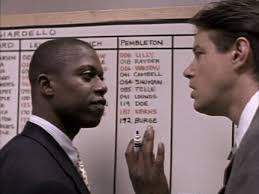My birthday fell during the government shutdown so The
Beloved Spouse™ gave me one of my gifts early, seeing as how I’d have time to
properly appreciate it: the boxed set of Barry Levinson’s groundbreaking series
Homicide: Life on the Streets.
I discovered Homicide
late in its run; TBS had never seen it. Only heard
of it because I liked to
talk it up based on what I remembered and because I’d read her excerpts from
David Simon’s book during my periodic re-readings. I had high hopes and she
figured she was along for the ride. We were both pleasantly surprised.
Homicide was a
show that exemplified Joseph Wambaugh’s dictum of how a good cop story is less
about how the cops work on the case than it is about how the case works on the
cops. Each character is unique and each responds differently to the demands of
the job. Members of Al Giardello’s squad come and go and not always on the best
of circumstances. The egos are large—these are, after all, murder police, the
cream of the crop—and so is the pressure.
Fans of The Wire
who have not seen Homicide need to.
Not only does it capture the essence of the book that so much of The Wire was based on, you’ll see
countless characters who later showed up in the later series. You won’t know
the names of a lot of them, but you’ll recognize them. “Hey, that’s the medical
examiner from The Wire!” “That’s the councilman
in the wheelchair!” The vibe is also similar, or at least as similar to HBO as
a 90s TV show could get.
As with all great TV, the writing is superb. Showrunner Tom
Fontana pulled together a crew of writers (eventually to include David Simon
himself, still working at the Baltimore Sun
when the show premiered) that looked at the life of a homicide cop from every
angle. They not only weren’t afraid to go against the standard car chase and
shootout cop show, they became the anti. There are shows early on where almost
the entire episode takes place in The Box, where cops take their turns looking
to work confessions form people who wouldn’t even talk to them if they had a
clue. One episode takes place almost entirely on a subway platform, a commuter
crushed between a train and the platform, talking to one of the detectives
while the rest of the squad investigates whether this is an accident or a crime
and others search for the victim’s girlfriend so they can say good-bye.
As important as the writing is, no scenes so confined could
work without superb acting and Homicide
had no shortage of talent. The show is at its best when Frank Pembleton (Andre
Braugher) and Tim Bayliss (Kyle Secor) are tag-teaming suspects in the box.
Early seasons make more of the partnership dynamic than later seasons and the
show is better for it. Bolander (Ned Beatty) and Munch (Richard Belzer), Howard
(Melissa Leo) and Felton (Stephen Baldwin), Lewis (Clark Johnson) and Crosetti
(Jon Polito) all establish and maintain their own rhythms. Yaphet Kotto’s
performances are subtle masterpieces as he plays a half-black, half-Italian
unit commander who contains bits of Father
Knows Best, Gunnery Sergeant Hartman, and Vito Corleone.
The first two or three seasons are consistently the best,
but even a relatively weak episode in the later seasons is as good as anything
else you’ll see on television. Episodes that take your breath away pop up put
of the blue with unnerving regularity. Just as you feel the show is settling
into a formula something will happen that leaves you slumped in your chair when
it’s over. Not all the major events will be to your liking. None of the
characters is completely good, and the rivalries and ego clashes that erupt
keep the squad room from being anything but a “business as usual” environment,
but that’s part of what makes the show special: you’re never comfortable watching
it.
I’ve become much more interested in interviews than
forensics over the past couple of years and Homicide
came along for me at the perfect time. Crime scene details, fibers, ballistics,
and DNA reside in their proper roles of supporting the cops who gathering
witness statements and work people in the box. In other words, actual drama.
No show that has to produce 22 episodes a year can be
uniformly special, but few, if any, pulled it off as well as Homicide. If you haven’t seen it, you
should. And if you have, you should watch it again, if only to catch the really
special episodes. They’re masterclasses in pacing, dialog, and suspence.




3 comments:
I wonder if this is streaming. Don't have a DVD player anymore.
There are quite a few episodes on YouTube, though the quality is suspect. Plenty of scenes, some of them very good. Again, the viewing quality is suspect. I don't know if Hulu has them. I know Net Flix and Amazon Prime do not.
This is a fantastic overview of how 'Homicide: Life on the Street' broke new ground in the crime drama genre. It's incredible to see how the show's character-driven storytelling and realistic portrayal of law enforcement have influenced so many of today's top series. One thing that particularly stands out to me is how the use of handheld cameras and on-location shooting gave the show a gritty, documentary-like feel, setting it apart from other dramas of the time. As someone who recently wrote an article on the show's impact 25 years after its finale, I couldn't agree more with your points. If anyone's interested in exploring more about how 'Homicide' reshaped television and continues to resonate in the streaming era, I recently dove into this topic in depth. You can check it out here https://trendingcoolnews.com/homicide-life-on-the-street-on-peacock/
Post a Comment